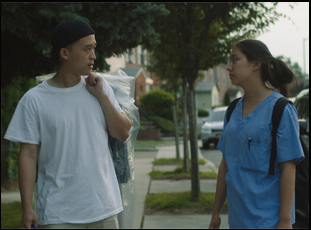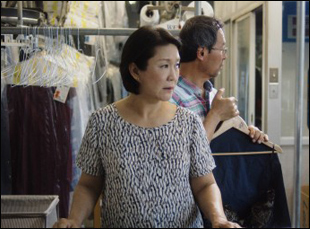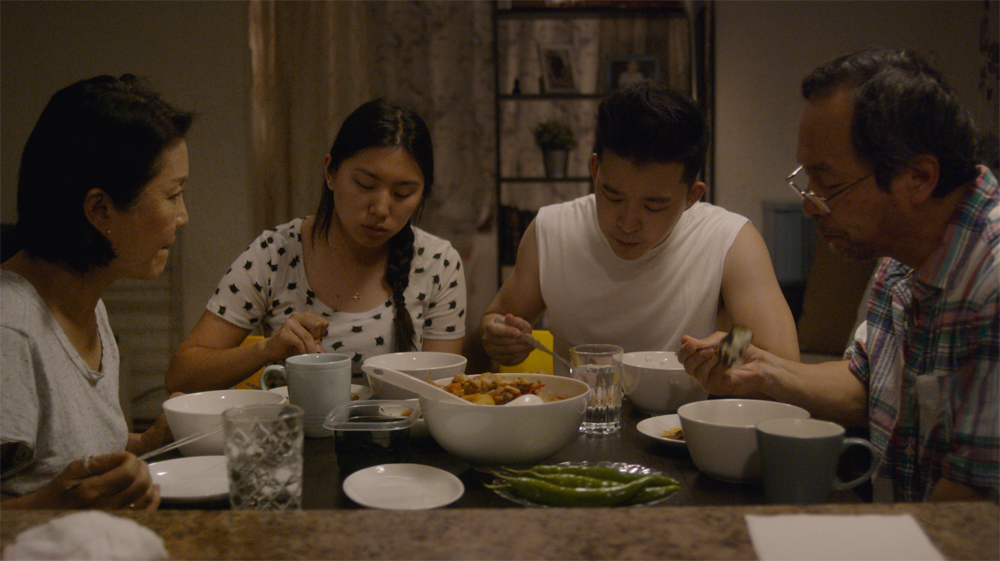Peter S. Lee and Julian Kim knew that they had a pretty unforgiving schedule on their debut feature “Happy Cleaners,” particularly after the film had been shot and they got back to the editing room where they would have to finish it in a relatively short amount of time. For others, this surely would’ve meant cutting corners, but for Lee and Kim, it was an exciting opportunity, especially when a more traditionally sourced soundtrack from a single composer simply wasn’t an option.
“We wanted to work with a lot of other Asian-American artists within our community, so that was one very intentional way to work with as many people different people as possible,” says Lee.
Adds Kim, “We didn’t know what kind of music we were going to have going in when we were shooting, but during the post process, we were working with different artists and we were so, so blessed to see the kind of music we were getting, especially the last track “Word to the Hyphen” by Year of the Ox — when we sent the film to them, they were just like, ‘Yo, we got this.’ And when we first heard that, we were just shaken up by how real and how good it was.”
Not only is the diversity of artists reflective of the spirit of community that Kim and Lee set out to capture in “Happy Cleaners,” but also the fact that there is no monolithic Korean-American experience, despite having similar upbringings themselves. Both the children of hard-working immigrants, they tell the story of the Choi family, settled long enough in Flushing, Queens to include Kevin and Hyunny, two fully assimilated college kids. But whether the siblings want to stay in school is another question entirely, with Kevin eager to become an entrepreneur, serving up yucca fries from his Big D’s food truck, and Hyunny is concerned about her boyfriend Danny, whose thoughts about dropping out to help support his parents financially are rubbing off on her. Naturally, their parents (Charles Ryu and Hyang-hwa Lim) are adamant they graduate – and their dry cleaning business has made it possible to afford the cost, but given their shop is being eyed for redevelopment as their lease comes up for renewal, it becomes clear that life will change for the clan in significant ways no matter what decisions they make.
Although others have told the story of children who have benefited from the sacrifices their parents made for them, but may feel repeating the same path as a waste of that freedom, Kim and Lee create a dynamic drama that feels fresh in exploring every angle with grace and nuance as the Chois are caught between the responsibility to each other and what’s best for their own personal growth, unsure of when is best to adhere to tradition or try something different. Honoring both paths, “Happy Cleaners” has been a favorite among all ages at recent festivals such as the L.A. Asian Pacific Film Festival and the CAAMFest in San Francisco and with the film having its hometown premiere at the Asian-American International Film Festival this week in New York, Kim and Lee spoke about how they came together as collaborators, making the most of limited resources and the trouble with making BBQ an integral part of a film.

Peter S. Lee: We both grew up in Flushing, Queens and [Julian’s] like a neighborhood buddy. He’s two years older than me and went to the same church and were part of the same youth group. He was a guy who was always like, “Yo, I want to be a filmmaker” and then we go to college and he calls me up out of the blue, saying like, he needs someone to be his producer on his senior thesis film. I was a freshman then and I was like, “Dude, I’ve never done anything like this” and he was like, “I just need someone I can trust with my money.” [So I said,] “Alright. I can do that.” I got to manage his thesis film and really got my crash course [in filmmaking] right then and there. I just fell in love with it and switched my major. While I was finishing up, he was just telling me how brutal life outside school was since he had graduated a few years ahead and was really bummed about how the last film that he made was his thesis film. That really got me thinking like, “Well, it doesn’t have to be that way. Why don’t we just do it ourselves with whatever resources we had?” So we just started making short films together and then seven years later, we finally got an opportunity to make a feature film.
Julian Kim: And we always wanted to tell a story of our neighborhood, Flushing, because we set off on a personal quest to find out who we are, going through an identity crisis, and part of that was let’s go explore our hometown and where we grew up. Flushing was such an eclectic neighborhood – culturally, it’s very diverse and there’s nowhere else like it and there were a lot of stories in Flushing, but I thought it was not being told on the screen, so we wanted to explore that. Peter and I just wanted to share what kind of experiences we had — the struggles we had growing up in an immigrant family. We just put that together pen to paper and just wrote it out.
Just a glance at the credits suggests the community really came together to make this film.
Peter S. Lee: Yeah, as far as crew goes, the department heads were guys that we grew up with from our film school days who worked on every one of our shorts and yes, they are New York-based locals. And it was a slightly unusual set-up in the sense that Korean American Story, a non-profit came onboard to executive produce this project…
Julian Kim: They really helped fuel the narrative and the story and the project to get it kickstarted. When we told them about the project, they were very excited and it aligned with their mission, so it was a collaborative effort in getting it together. We used their resources, seeing what other Korean-Americans were like in their library of stories, and used part of that in our study homework.
Peter S. Lee: They [also] held multiple fundraisers for us so we can get the production going and then Kickstarter came around when we needed additional funds for post. The community really responded and it was so overwhelming that honestly we feel like we made a film with the community, so we’re very proud of that.
Is it true that one of your actors Hyang-hwa Lim, who plays the mother, hadn’t acted in 40 years? If so, how do you even go about finding her?
Peter S. Lee: Yeah, Hyang-hwa was actually through Korean American Story. We were very intentional about trying to be authentic with our portrayal of the lives that we lived and we don’t have access to major casting networks or any of that, so it really was very grassroots and our challenge was how do you find somebody who’s bilingual in the sense that were actually Korean native speaking, but an actor of that generation. That’s really hard to find and [Hyang-hwa] was a huge stage actress in Korea in the late ‘60s/early ‘70s, but then marriage and life happened and she was a mother for the next 40 years. I guess one of her friends told her, “Hey, there’s a project like this,” and she thought it’d be a perfect role. and she responded and we connected and there was instant chemistry.
Julian Kim: Yeah, when we told Mrs. Lim about the role, she was like, “Oh, I have 30 years of preparation. I lived through it. So it’s natural.”
Peter S. Lee: We found [Jaehee Wilder, who plays] Grandma that way too, through somebody from the organization. She was not an actor, but had a lot of interest in theater and thought it would be a cool little project to do. Then Charles [Ryu,] who plays the father, we had the experience of working with him in the past because he’s actually a United Methodist pastor for his day job, but he took acting classes 30 years ago to become a better preacher. And who would’ve thought he would tap into that 30 years later to act? The kids, we found through Backstage or the conventional auditioning method, so it was a mixed bag.

Julian Kim: It just became a family ensemble story and the focus wasn’t so [centered] on Kevin or Hyunny, but a lot of reaction was [for] the mom and dad. When we first wrote the script, it was a bigger family. We had a bigger role for the aunt [for instance], but we had to whittle it down because there’s only so much time we and so much story to tell within an hour [time]frame. So we were like well, let’s just focus on the two siblings and their experiences and how they grew up differently and react differently to this immigrant life. [Hyunny] just feels like she’s responsible and she has to take care of the parents whereas Kevin, he’s a wild child who wants to go on and lead his own life and it feels like his parents are a burden, so we wanted to show that contrast, but also different experiences and how do you react to that. [And the surprise was] to have [the audience] really relate to [the parents]. They weren’t so two-dimensional and that was such a great takeaway that we had. We were just very pleased with the execution. More than anything, just sitting there watching Ms. Lim and Charles, you don’t feel the energy when you’re there on set, but when you really see that in post and you’re watching it on the big screen and just her voice… it just roars at you.
The dinner scenes are great for many reasons, but the most obvious is that the food looked great, yet sometimes I know if you do too many takes, the actors may wind up eating too much. Did that end up being a challenge?
Peter S. Lee: A challenge only in the sense that we didn’t have a professional chef or a food production team handling that, and as you could imagine, we filmed all that on location in a tiny New York City apartment, so the kitchen would double as a prep station and dressed to shoot. But food being an integral character, that was intentional from the get-go, so there was no challenges other than getting it made.
Julian Kim: It was a happy challenge. [laughs] That’s the best way to put it.
Peter S. Lee: The most challenging part was eating all of it.
Julian Kim: Yeah, [because] we wanted to make sure no food went to waste and the crew was so excited as soon as the take was over to finish the stuff on the table. [laughs]
You’ve said you wanted to make a film your parents could enjoy – have they?
Peter S. Lee: Yeah, last Thanksgiving, my in-laws and my mom were here at my apartment so I ended up showing them the film and it was the first time actually showing the film to anybody from that generation. We really weren’t sure what the reaction would be, but after watching it, my mother gave me her verbal blessing to continue to pursue filmmaking. So far, it’s been very much the silent “I’m not going to fight you on it, but I still wish you went the traditional route…” like every so often, “When are you going to go back to graduate school?” [laughs] But after that Thanksgiving, she just said, “You know what? I see now why you chose this and why you have to do this, so go for it.” That was powerful.
Julian Kim: And my parents haven’t actually seen the film yet, but it was to save up to have the theatrical experience. This Asian-American International Film Festival in New York will be their screening and we’re just really grateful and honored that I get to show it to them there.
“Happy Cleaners” will screen on August 3rd at 7 pm at the Asian-American International Film Festival in New York at Asia Society.




